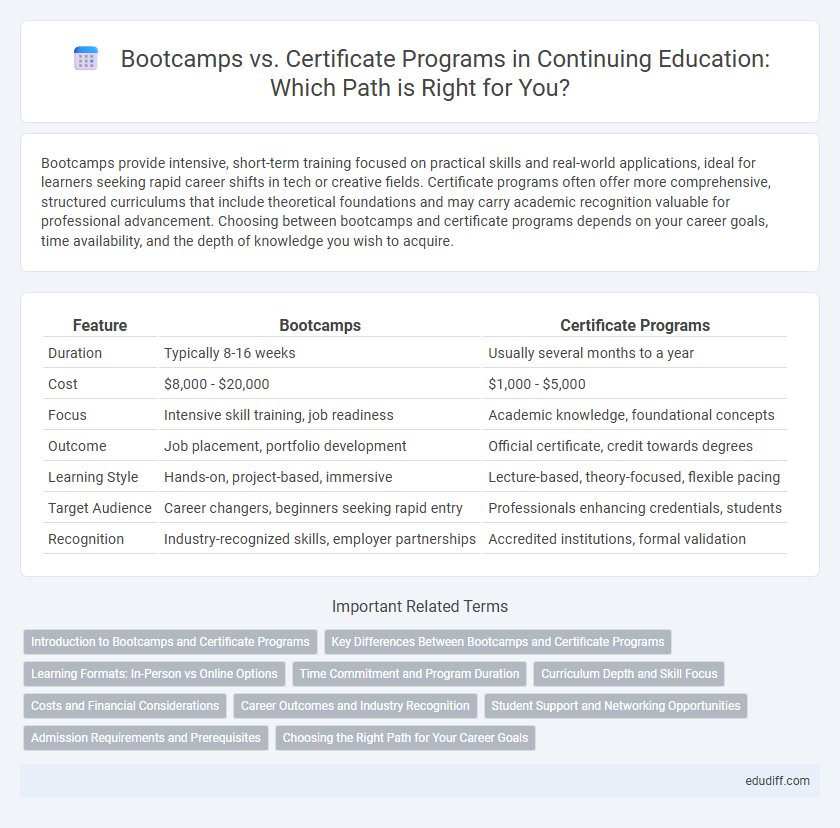Bootcamps provide intensive, short-term training focused on practical skills and real-world applications, ideal for learners seeking rapid career shifts in tech or creative fields. Certificate programs often offer more comprehensive, structured curriculums that include theoretical foundations and may carry academic recognition valuable for professional advancement. Choosing between bootcamps and certificate programs depends on your career goals, time availability, and the depth of knowledge you wish to acquire.
Table of Comparison
| Feature | Bootcamps | Certificate Programs |
|---|---|---|
| Duration | Typically 8-16 weeks | Usually several months to a year |
| Cost | $8,000 - $20,000 | $1,000 - $5,000 |
| Focus | Intensive skill training, job readiness | Academic knowledge, foundational concepts |
| Outcome | Job placement, portfolio development | Official certificate, credit towards degrees |
| Learning Style | Hands-on, project-based, immersive | Lecture-based, theory-focused, flexible pacing |
| Target Audience | Career changers, beginners seeking rapid entry | Professionals enhancing credentials, students |
| Recognition | Industry-recognized skills, employer partnerships | Accredited institutions, formal validation |
Introduction to Bootcamps and Certificate Programs
Bootcamps offer intensive, hands-on training designed to quickly build practical skills in fields like coding, data science, or digital marketing, often spanning a few weeks to a few months. Certificate programs provide a structured curriculum focused on theoretical knowledge and foundational concepts, typically extending over several months to a year. Both pathways aim to enhance career prospects, but bootcamps prioritize rapid skill acquisition while certificate programs emphasize comprehensive understanding.
Key Differences Between Bootcamps and Certificate Programs
Bootcamps emphasize intensive, short-term training focused on practical skills and project-based learning, typically lasting a few weeks to months. Certificate programs often provide a broader curriculum with theoretical foundations and may extend over several months to years, culminating in official accreditation. Bootcamps prioritize rapid job readiness, whereas certificate programs balance skill acquisition with comprehensive academic knowledge.
Learning Formats: In-Person vs Online Options
Bootcamps offer immersive, fast-paced learning with options for both in-person and online attendance, catering to diverse learning preferences and schedules. Certificate programs typically provide structured, flexible formats that can be completed fully online or through blended in-person sessions, ideal for balancing education with other commitments. Both formats emphasize practical skills, but bootcamps often prioritize hands-on projects and real-time interactions, while certificate programs focus on comprehensive coursework and assessments.
Time Commitment and Program Duration
Bootcamps typically require an intensive time commitment, ranging from 8 to 12 weeks of full-time study, allowing students to quickly gain practical skills in a condensed period. Certificate programs often span several months to a year, with part-time options that accommodate learners balancing work or other responsibilities. The shorter duration of bootcamps suits those seeking rapid entry into the workforce, while certificate programs provide a more flexible schedule for gradual skill development.
Curriculum Depth and Skill Focus
Bootcamps emphasize intensive, hands-on training with a curriculum centered on practical coding skills and real-world projects, enabling rapid skill acquisition tailored for specific job roles. Certificate programs offer a broader academic curriculum that covers theoretical foundations alongside applied skills, supporting a deeper understanding of the subject matter. Bootcamps prioritize immediate job-ready competencies, whereas certificate programs balance skill development with comprehensive knowledge applicable to long-term career growth.
Costs and Financial Considerations
Bootcamps typically range from $7,000 to $15,000 for intensive short-term training, while certificate programs vary widely, often costing between $1,000 and $10,000 depending on the institution and duration. Financial aid options for bootcamps may include income share agreements and employer sponsorships, whereas certificate programs often rely on scholarships, grants, or tuition reimbursement. Prospective students should analyze total expenses, including materials and opportunity costs, to make informed decisions aligned with their career goals and budget constraints.
Career Outcomes and Industry Recognition
Bootcamps often emphasize practical, hands-on skills and rapid job placement, making them highly valued in tech industries seeking workforce-ready candidates. Certificate programs provide deeper theoretical knowledge and are frequently recognized by academic institutions and traditional employers, enhancing credentials for career advancement. Both pathways offer distinct career outcomes, with bootcamps excelling in immediate employability and certificates boosting long-term professional credibility.
Student Support and Networking Opportunities
Bootcamps often provide intensive student support through mentors, career coaching, and peer collaboration, fostering a strong community environment. Certificate programs may offer structured networking events with industry professionals, but their support tends to be less personalized and more academic in nature. Comprehensive student services in bootcamps typically enhance employability by connecting learners directly with hiring partners.
Admission Requirements and Prerequisites
Bootcamps generally have minimal admission requirements, often prioritizing motivation and basic computer proficiency over formal education, making them accessible to a wide range of learners. Certificate programs typically require a high school diploma or equivalent and may include prerequisites like foundational coursework or specific skill assessments. The streamlined admission process of bootcamps contrasts with the structured prerequisites of certificate programs, influencing the ease and speed of enrollment.
Choosing the Right Path for Your Career Goals
Selecting between bootcamps and certificate programs hinges on your career objectives, time commitment, and learning style. Bootcamps offer intensive, hands-on training ideal for rapid skill acquisition and entry into tech fields, whereas certificate programs provide more structured, in-depth knowledge suitable for foundational learning and career advancement. Evaluating factors such as industry recognition, curriculum relevance, and networking opportunities ensures alignment with your professional aspirations and maximizes job market competitiveness.
Bootcamps vs Certificate Programs Infographic

 edudiff.com
edudiff.com